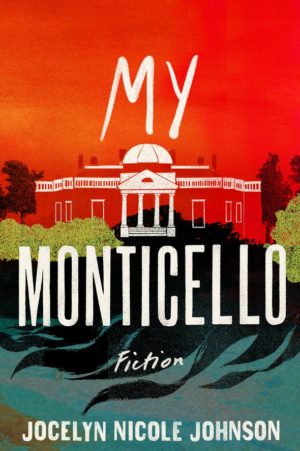My Monticello
by Jocelyn Nicole Johnson
reviewed by Hannah Joyner
The title novella in My Monticello, Jocelyn Nicole Johnson’s debut collection of short fiction, is set in a dystopian future that mirrors the crises of our own day. Following a summer of wildfires, extreme heatwaves, and “a national election girded by massive demonstrations,” narrator Da’Naisha Hemings Love explains, the East Coast is hit with “great and terrible storms” that disrupt transportation, take down the power grid, and cause mobile phones to go “glitchy and dark in our palms.” As she says, “It was unclear if we were under siege, or whether the world was toppling under its own needless weight.”
At this moment of chaos, white supremacists pour into Charlottesville, VA. Men drive through neighborhoods, setting fire to the homes where Da’Naisha and her Black and brown family and neighbors live. Together with a married white couple and Da’Naisha’s white college boyfriend Knox, they flee and take refuge at Monticello, the historic home of Thomas Jefferson.
Da’Naisha is a descendant of Thomas Jefferson and Sally Hemings, Jefferson’s “darker but not very dark never-wife,” whose six children were all fathered by the man who held her in bondage. The refugees fleeing from violent white supremacists establish a settlement in the home their ancestors were forced to build. The plot is one of the novella’s greatest strengths; through it, Johnson examines climate change and racism, as well as interracial relationships and alliances.
Although unexplained in the novella, Da’Naisha’s last name is, just as much as her middle name, an historical allusion: in Loving v. Virginia, the Supreme Court ruled laws banning interracial marriage unconstitutional. Interracial relationships between Black men and white women are at the heart of Johnson’s novella, from the Jefferson-Hemings case up through the Black protagonist’s romance with Knox. Although Da’Naisha questions the future of her own relationship, she eventually reveals to Knox that she is pregnant. Johnson’s heroine becomes the matriarch of her own story, even in the midst of crisis.
The title novella is by far the most compelling piece in Johnson’s collection. Although the accompanying short stories—also set in Virginia—explore stimulating questions about Black identity, several of them feel like assignments for a creative writing class on experimental styles of narration. “Something Sweet on Our Tongues” is told through first-person-plural narration, “Virginia is Not Your Home” employs the second person, and “The King of Xandria” uses an especially cold impersonal third person. “Buying a House Ahead of the Apocalypse” consists exclusively of bullet-pointed imperatives.
Narrated in epistolary style, the darkly satirical “Control Negro” is the strongest of the five short stories. The main character is a professor who seeks to understand just how much race (and racism) matter to life outcomes. To answer this question, he decides he needs “a Control Negro” free from the disadvantages of his own childhood.
The professor fathers a son to serve as his experimental subject and observes him from afar. Sometimes he simply collects data, while at other times he tries to influence his son’s choices, by encouraging him, for instance, to participate in swimming rather than “the fraught cliché of basketball.” His goal is to “prove [his son] was so strikingly decent and true that America could not find fault in him unless we as a nation had projected it there.” When the young man nears the end of college, the professor convinces himself that his son has “made it out past an invisible trip wire, out to some safe and boundless future.” Predictably, his hope doesn’t come to pass—instead, the young man becomes the victim of police brutality.
Although the short stories in Johnson’s debut are generally formulaic and underdrawn, the title novella’s resonant themes and smooth prose are powerful enough to make My Monticello a stunner. When Johnson turns her skill to longer-form and more developed work, she will be poised to make a major contribution to contemporary American literature.
Published on November 17, 2021

